Studying the past is important. Don’t believe me? Well, check this guy out:
This guy sits outside the researcher entrance to the National Archives in DC, where I’m still camping out. Apparently he is just meant to be “the past,” and not any particular ancient historian. This is probably for the best, because let’s be honest — some of those guys were a little sketchy by modern standards.
Anyway, I’m still looking through the Legislative Archives. My little document-of-the-day relates to our good buddy, Edward Teller. If there’s one thing I’ve learned from looking at my blog statistics, it’s that the world is still pretty interested in Edward Teller. Gotta give the people what they want, eh? Well, why not — he’s always good for something unusual.
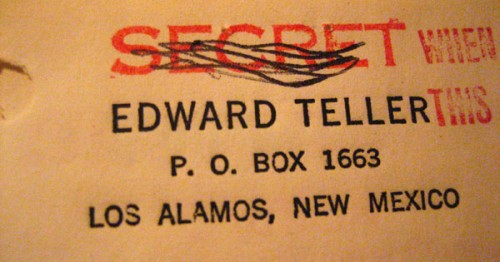
“From the Desk of Edward Teller.” Did he pre-apply the “SECRET” stamps? It probably would have saved a lot of time.
This document dates from early 1953, when the Joint Committee on Atomic Energy was preparing a 93-page “chronology” of the history of the hydrogen bomb. The goal was to show, in plain “objective” facts, that the hydrogen bomb program could have been executed a lot earlier, that mismanagement if not outright treachery was responsible for the “lag” in its development, and that Klaus Fuchs probably could have given the Soviets a lot of great information based on the work he had been privy to in 1946.
For a lot of reasons, historians don’t generally agree with this assessment of things. Aside from the fact that it is only with the value of hind-sight that one had any idea of how to make one, they lacked the computational ability to run the relevant calculations in the late 1940s, lacked the experimental data provided by actually setting of a number of nuclear tests, and had their hands busy just trying to convert the original ad hoc atomic bomb models into reliable weapons, while at the same time trying to grow the nuclear stockpile and transition the nuclear weapons complex from wartime to peacetime. The “it could have been done earlier, Fuchs could have given useful information to the Soviets” argument was basically an attempt to crucify Oppenheimer and the more left-leaning scientists for having dared to oppose building the weapon in late 1949 (when it was still completely unclear whether one could even be built). This isn’t to say that everything was done in exactly an optimal order or speed — it’s just to say, from the perspective of the 1940s, the actions taken with respect to the H-bomb made complete sense, and the idea that there was intensive mismanagement, much less treachery, behind the “lack” of progress, is unsubstantiated. (It’s also a really poor view of how complex technologies get invented, but that’s another story.)
OK, back to our document. This is an account of a discussion between Edward Teller and John Walker, a JCAE staffer, written up by Walker after the fact, dated January 13, 1953. It is fodder for the evolving H-bomb “chronology” that the JCAE was building up, and contains Teller’s recollections about early H-bomb history.1
There are a number of interesting/amusing things here:
- Dr. Teller “carried the ball” at the Summer 1942 conference in Berkeley. Or, as other participants put it, he dominated and completely side-tracked the meetings.
- “It was the general attitude at this point [in 1942] that the H-bomb was not only feasible but ‘easy.'” This is either a typo (the “A-bomb” was considered “easy” from a theoretical physics point of view, at this conference — this turned out to be a wrong understanding), or just plain wrong. The general conclusion of the 1942 conference is that the H-bomb was pretty unlikely. Teller might have thought it was feasible and “easy” but even that is a stretch.
- Teller claims that Oppenheimer told him, within days of the Nagasaki attack, that “it was all over and that Dr. Teller should go home and that the laboratory should close up.” This is almost certainly false as well, or at least a misunderstanding. I read these sorts of things less as Teller lying than of Teller creating odd, reality-divergent (a nice euphemism) composite memories in his head. Teller got it in his head at some point that Oppenheimer suddenly became a peacenik after Hiroshima and Nagasaki, and this perception colored all of his memories afterwards. In fact, as we know, Oppenheimer remained heavily involved in all manner of military and atomic policy, and recommended thoroughly “macho” policies like the creation of vast numbers of tactical nuclear weapons.
- Teller dates the invention of the “Alarm Clock” model of the H-bomb (which was never built) to August 31, 1946. How does he remember it so specifically? “This is the day Teller’s daughter was born which pegs his recollection.” Ah. Well. (Incidentally, I have met Teller’s daughter, who is really quite nice.)
- Teller repeatedly recalls everyone at various conferences thinking that the H-bomb was easy, and full-steam-ahead. This really contrasts with the accounts by others at said conferences, who remember Teller as being ridiculously optimistic and everyone politely declining to point out every time he was off his rocker about it. (On this point, there is a really quite interesting interview with Robert Serber in the AIP’s Niels Bohr Archives. “It was my opinion that Teller always cheated in his calculations. … He made them overly optimistic, and he never ran them — never made an honest estimate.”) One of the issues with this particular history is that when Teller authored reports (or write-ups of conferences), the conclusions were almost uniformly positive. In the above-linked interview, Serber discusses that a bit as well.2
- Apparently Teller suggested the name “elugulabium” (after the vaporized island of Elugelab) for element 100, which was discovered in the radioactive debris of the Ivy Mike shot. (Instead it was given the name Fermium.) He claims that “the staff” suggested the name “tellerium” for element 99, which was also found in the debris. (Einsteinium was instead chosen.)
Lastly, Teller claims that Oppenheimer “telephoned him at Princeton and was nice enough to invite Teller to cocktails at his house.” (Note to self: Oppenheimer always gets a lot of credit for his cocktails. You invent the atomic bomb, and everyone remembers you for your martinis. I must learn how to make better martinis.) “At this time, Dr. Oppenheimer discussed the possible use of H-bombs in Korea. Sometime later, Dr. Oppenheimer called Dr. Teller on the long-distance ‘phone and stated that he had presented this idea at the Pentagon and that the suggestion went through channels other than Dr. Oppenheimer to General Eisenhower.” True? I’m a little skeptical. It’s not strictly impossible — and as we’ve already seen on here before, Oppenheimer was a complicated figure who issued some contradictory opinions over the years.
Interestingly, in 1977, former AEC Commissioners Henry DeWolf Smyth and Robert Bacher had a pow-wow on just this question. In the Bacher papers at the Caltech Archives, there is a letter from Smyth to Bacher asking if he had heard about this claim, that Teller was sending it around again. Smyth noted that he didn’t think it was very likely, because if it had been true, Lewis Strauss probably would have eventually found out, and had a field day with it. Smyth also admitted that
Perhaps I should also state that I have had a dislike for Edward Teller that almost amounts to a physiological reaction since I first him in Göttigen about 1930. He makes my flesh creep. This feeling reasserted itself when I met him at a hearing in Washington about ten days ago.
Youch. Smyth believed that maybe this went a little too, and recommended in a handwritten note that Bacher “destroy this letter,” as it was “a bit too frank for the files.” Bacher apparently didn’t (and now it’s on the Internet!). Teller wrote to Bacher later that year claiming more or less the same as above, except noting that he (Teller) thought the idea was ridiculous, since in 1952 they didn’t have a weaponized H-bomb, and that, coming from Oppenheimer, the suggestion “took my breath away.” He then claims that he was thoroughly against the idea:
My reaction was defensive and emphatic. Not understanding what Oppenheimer could have in mind and not wanting to be involved in any matter whatsoever, I told Oppenheimer that I would have nothing to do with such an attempt. I failed to point out to him that in any case we were not in a position to do so. After all, he was fully informed on the technical situation without my pointing out this important circumstance.
Interesting how this emphatic denial doesn’t show up in the Walker account. I suspect this is a little bit of the aforementioned mis-memory creeping back in to the narrative — embellished, improved upon, made a little more self-righteous over the years. In this story, it’s Oppenheimer who is the hawk, and Teller who is the dove. Like the “Study the Past” statue guy, I’m a little skeptical.
- Source: John Walker, “Memorandum for the File,” (13 January 1953), in Records of the Joint Committee on Atomic Energy, RG 128, National Archives and Records Administration, Washington, D.C., Series 2: General Subject Files, Box 58, “Teller, Edward.” [↩]
- “Well, I mean I don’t really remember much about the discussion, but my main memory is at the end when Edward wrote up a report on the conclusion of the [1946] conference, and the report was incredible, and there was a conclusion point that said it was almost certain that it would work. I don’t know if it was to make a record for any future work. I didn’t want to discourage Edward from pursuing what he wanted to do, and I thought to tell him what was to more closely the truth than the report, so we went over it and then modified the more extreme statements. But it was pretty optimistic. I went back to Berkeley. A couple of months later it came to me undamaged and it had my name on it.” [↩]
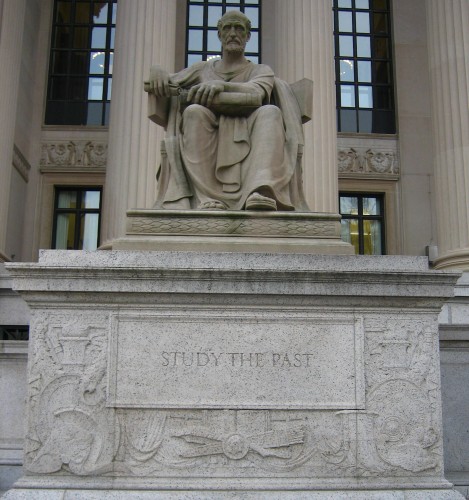
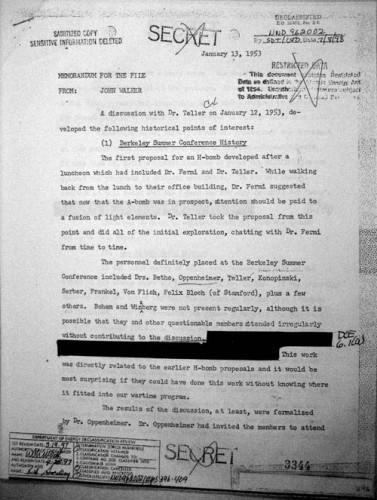
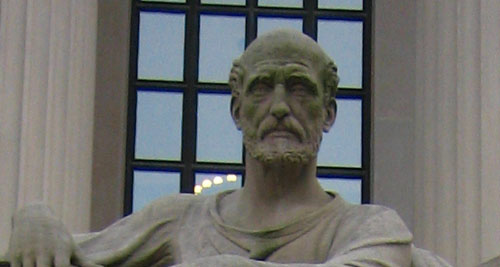

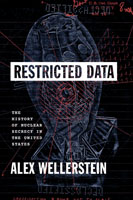
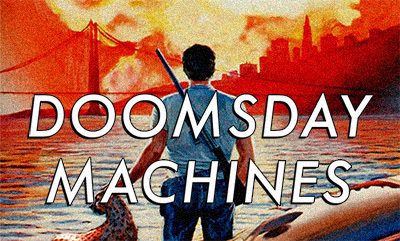
[…] (Poor Edward Teller — always grumpy!) […]